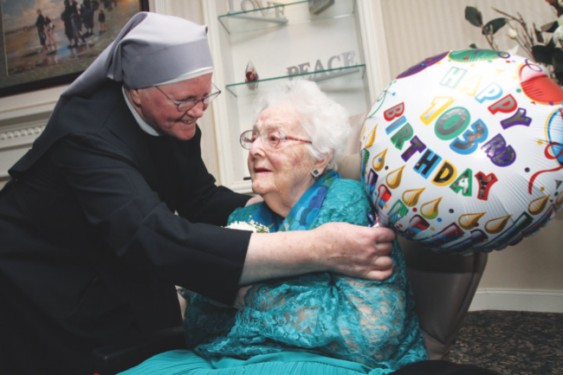
By Kurt Jensen
WASHINGTON (CNS) – Visuals often are much easier to grasp than a complicated thicket of issues. That may be why the Little Sisters of the Poor have become the public face of Zubik v. Burwell, which goes before the U.S. Supreme Court March 23.
Zubik is not just about the religious order’s legal challenge of the Obama administration’s contraceptive mandate for employers. It is a consolidated case also involving East Texas Baptist University, Southern Nazarene University and Geneva College, which is a Presbyterian institution, as well as Catholic entities, including the Archdiocese of Washington, the dioceses of Pittsburgh and Erie, Pennsylvania, and Priests for Life.
Both sides on the mandate issue have been working to attract public support. The Little Sisters, like Priests for Life, have launched a website explaining their side of the issue, and of any of the cases, the Little Sisters’ suit has received the most attention, media and otherwise.
In January, two Little Sisters sat in the House Chamber for the State of the Union address, invited by House Speaker Paul Ryan, R-Wisconsin. The religious order also has been invoked on the campaign trail for the Republican presidential nomination by U.S. Sen. Marco Rubio, R-Florida, who pointed to the order’s mandate suit as part of the ongoing fight for religious liberty.
Once the high court hears oral arguments in Zubik v. Burwell, a decision is expected before the court term ends in June.
With the death of Associate Justice Antonin Scalia, it is widely predicted the result will be a 4-4 tie. In the 2014 Hobby Lobby case, Scalia provided the deciding vote in a 5-4 decision, and two private, for-profit companies that objected to the mandate on moral grounds prevailed in their argument that complying placed an undue burden on their religious freedom. The court ruled that closely held companies – meaning, with limited shareholders – are exempt.
In all of the cases to be argued before the high court in March, appellate courts in various jurisdictions sided with the Obama administration.
Ruled Against EWTN
On Feb. 18, the 11th U.S. Circuit Court of Appeals in Atlanta ruled against the Eternal Word Television Network and three other Catholic entities. That ruling also said the HHS mandate should not be enforced until the Supreme Court rules on the issue.
One ruling that has gone against the Obama administration was handed down Sept. 17, 2015, by a three-judge panel of the 8th U.S. Circuit Court of Appeals in St. Louis. The panel upheld a district court ruling that said the mandate does burden the religious liberty of the plaintiffs, who include three Christian colleges in Missouri, Michigan and Iowa.
The Denver-based Little Sisters order, which operates nursing homes for the elderly poor, has been the symbol of the case since Dec. 31, 2013, when Supreme Court Justice Sonia Sotomayor issued a stay hours before the order would have had to comply with the mandate.
Under the federal Affordable Care Act, most employers, including religious ones, are required to cover employees’ artificial birth control, sterilization and abortifacients, even if employers are morally opposed to such coverage.
Churches and institutions that primarily employ and serve their own members are exempt.
The Little Sisters, like the other plaintiffs in Zubik v. Burwell, object to doing this for their employees under their health insurance plan, the Christian Brothers Employee Benefit Trust. Citing the 1993 Religious Freedom Restoration Act, known as RFRA, the religious order says the mandate amounts to an undue burden on their free exercise of religion.
To respond to religious objections, the Department of Health and Human Services (HHS) created an “accommodation.” Any organization with religious objections to providing the coverage must state that in writing in order for HHS or the Department of Labor to direct a third party provide contraceptive to the organization’s employees.
In its friend of the court brief filed in the Zubik case, the government says the case comes down to “whether the RFRA entitles petitioners not only to opt out of providing contraceptive coverage themselves, but also to prevent the government from arranging for third parties to provide separate coverage to the affected women.”
The Catholic and other plaintiffs in Zubik object to that third-party notification because they say they still would be complicit in providing coverage they oppose.
The brief from the U.S. Conference of Catholic Bishops zooms in on the argument: “History is replete with instances in which an individual went to his or her death to avoid committing an act objectionable to the individual on religious grounds, though thought by others to be innocuous.”
